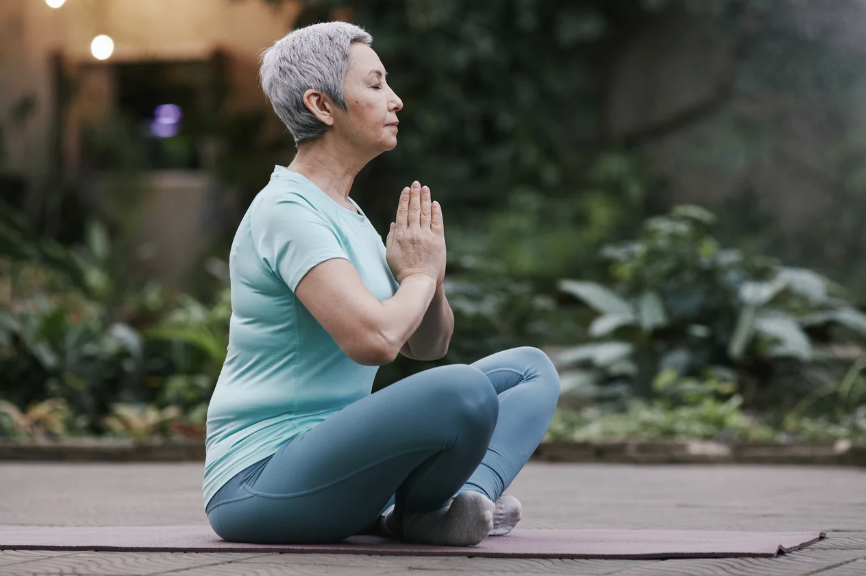
© 2022 Radiant Heart • Laguna Beach, CA 92651
christine@radiantheart.health • +1 404-438-8700
Privacy Policy | Terms & Conditions | Disclaimer
All Rights Reserved 2022
Yoga Therapy & Allied Mental Health
Transforming Trauma Recovery: Integrating Embodied Therapy
for a Unified Approach to Healing and Resilience
How Yoga Therapy Supports Trauma Recovery
Yoga therapy offers a somatic, bottom-up approach to trauma recovery that complements traditional top-down methods such as Cognitive Behavioral Therapy (CBT) and Dialectical Behavioral Therapy (DBT). Because trauma is not only held in the mind but also in the body and nervous system, a purely cognitive approach may miss key areas of healing. Yoga therapy addresses this by working with the body—through breath, movement, and interoception – to regulate the nervous system, release stored tension, and support emotional resilience.
By integrating yoga therapy into allied mental healthcare, clients experience a more whole- person path to healing – one that unites mind, body and spirit. This integrative approach enhances emotional regulation, builds nervous system capacity, and supports long-term recovery.
What is Yoga Therapy?
Yoga therapy is an integrative, body-centered approach that addresses the whole person—body, mind, and spirit. It goes beyond traditional treatments by working across the physical, mental, and emotional layers of healing.
Through movement, breathwork, mindfulness, and somatic practices, yoga therapy helps individuals regulate their nervous system, reduce stress, and improve emotional self-regulation.
Rather than isolating treatments for specific conditions, yoga therapy focuses on the person as a whole, helping release what no longer serves them and guiding them toward sustainable health. It plays a key role in trauma recovery, emotional balance, and metabolic health, enabling clients to reconnect with their bodies and experience a deeper sense of safety and emotional resilience.
As a Yoga Therapist, I also incorporate Ayurvedic principles* to support holistic healing, balancing the body's natural rhythms and addressing the five koshas (layers) of the body: physical, emotional, breath, mental and spiritual health.
Note: All Yoga Therapy and Ayurvedic tools are non-religious and are rooted in science, nature, and love.



Who can benefit from this embodied therapy?
Anxiety
Low Energy
Trauma Recovery
Depression
Chronic Stress
Sleep Challenges
Addiction Recovery
Behavioral Issues
Grief
Imparied Metabolism
Perfectionsim
Disordered Eating
Key Elements of Yoga Therapy:
Holistic Healing: Addressing the physical, mental, emotional, personality, breath, and spiritual layers of the body through personalized treatment plans, rather than isolating specific health conditions.
Movement and Mindfulness: Utilizing intentional, body-based practices to help clients regulate stress and enhance emotional resilience. This therapeutic movement is created through the lens of function over form.
Emotional Self-Regulation: Teaching individuals how to manage their emotional responses and maintain balance during challenging situations.
Sustainable Lifestyle Change: Promoting lasting shifts in lifestyle and mindset to enhance overall well-being, emotional health, metabolic function and overall happiness and well-being.
Eudemonia & Salutogenesis: Eudemonia refers to human flourishing—living a life of purpose and fulfillment. Salutogenesis focuses on health and well-being rather than disease. Supporting individuals in cultivating these ancient concepts empowers them to thrive in life, regardless of health conditions or terminal diagnosis.
Therapist's Approach: At the core, the therapist has a deep understanding of navigating an individual’s physical, mental, and emotional health challenges. The approach is grounded in compassion, empathy, love, and a sense of connection and community.
The Trajectory of Care Using Yoga Therapy:
Health Intake & Assessment: A thorough intake process to assess physical, emotional, and psychological history, providing a foundation for a personalized framework to begin our collaborative care.
Holistic Care Plan: Creating a bio-individualized yoga therapy framework that is a living practice to modify when needed. Beyond including therapeutic movement, breathwork and mindfulness practices to meet the client’s specific needs, it incorporates the person's values, wants and beliefs as it relates to their healthy lifestyle intentions.
Goal Setting & Progress Tracking: Collaborating with clients to set actionable goals, monitor progress, and adjust the plan as needed, focusing on small, incremental shifts in the body, mind, and heart to move toward a more authentic and desired state of being.
Long-Term Wellness & Integration: Helping clients integrate yoga practices into their daily lives, promoting emotional regulation, metabolic health, and lasting emotional resilience. This may include lots of "off the mat" work through self-development, daily rituals and incorporating a growth mindset.
How Yoga Therapy Complements Behavioral Health Approaches
Behavioral health treatments such as Cognitive Behavioral Therapy (CBT) and Dialectical Behavioral Therapy (DBT) offer powerful tools for cognitive and emotional processing. However, these top-down therapies may not fully address how trauma is held in the body and nervous system. Yoga Therapy complements these approaches by offering a bottom-up, somatic layer of care.
Through breath regulation, gentle movement, and mindful awareness, yoga therapy helps clients calm physiological stress responses, release stored tension, and develop emotional resilience. This allows individuals to not just understand their trauma cognitively— but also feel safer and more connected in their bodies.
Therapies like EMDR, which engage both the mind and body, align well with yoga therapy’s goals. Together, they support a more integrated, whole-person approach to trauma recovery, enhancing nervous system regulation and long-term healing.
How Yoga Therapy Adds Value to Behavioral Health Treatment:
Movement & Body Awareness: Using slow, mindful movements to improve proprioception, body awareness, and self- regulation. This practice helps to shift how trauma is stored in the body and facilitates emotional healing.
Breath Regulation: Conscious breathing techniques that regulate the nervous system, calm stress responses, and support emotional balance. These practices are crucial for managing anxiety and emotional dysregulation. .
Mindfulness: Developing body-focused attention to strengthen emotional regulation, reduce reactivity, and promote resilience.
Trauma Processing: Yoga therapy helps to release trauma stored in the body, facilitating the healing of emotional wounds through embodied practices.
Somatic Trauma Healing: Provides body-based practices (like breath and movement) for releasing trauma stored in the body, helping to heal emotional wounds through physical release. These techniques help release physical tension related to trauma, complementing therapies like EMDR and Brainspotting.
Emotional Regulation: Yoga therapy offers practical tools for managing emotional responses to stress, enhancing the work done in talk therapy.
Nervous System Regulation: Yoga therapy helps regulate the autonomic nervous system, which is key to managing stress, anxiety, and emotional dysregulation. Once the individual has established a safe foundation as an active operator of their nervous system, our care will focus on cultivating stress resilience.
Improved Metabolic Health: By reducing stress and improving emotional regulation, yoga therapy fosters metabolic health, helping clients achieve holistic healing mental health practices.
Healing in Action: Yoga Therapy's Effect on Emotional Resilience
"I went from feeling very stressed out, very anxious, to feeling much more centered and grounded. You get many tools to deal with stress, to create a bigger life, a more abundant life - and that's what I felt happened."
- Julie
" I didn't realize how different yoga therapy was from yoga. The exercises to release negative thought patterns was specifically valuable. Christine guided us to look at our lives through curiosity and wonder. "
- Cynthia
"I started doing yoga therapy with Christine and it changed my life. I had never done it before. She started me on a new path and I have not turned back!"
- Trish




Mental Health Partners:
A Collaborative Path for Deep Healing and Lasting Resilience
Integrating yoga therapy with traditional mental health care is essential for comprehensive trauma recovery. While talk therapy addresses emotional and cognitive healing, yoga therapy works with the body to release trauma, regulate the nervous system, and foster emotional balance. This combined approach offers a more holistic treatment that supports both the mind and body, providing clients with a deeper level of healing and resilience.
By working together, Yoga Therapists and Mental Health Professionals provide a more robust treatment plan that not only addresses immediate emotional needs but also promotes long-term well-being, emotional self-regulation, and metabolic health.
Key Benefits of Our Partnership
Holistic, Integrated Healing: Combining cognitive therapies and body-centered yoga practices for a comprehensive, whole-person approach to trauma recovery.
Nervous System & Emotional Regulation: Yoga therapy enhances emotional resilience by regulating the nervous system, supporting clients in managing stress and emotional reactivity.
Trauma Integration: By working directly with the body, yoga therapy helps clients release trauma and emotional blockages, complementing the cognitive work done in traditional therapies.
Sustainable Wellness: Providing clients with the tools they need to maintain emotional regulation, manage stress, and optimize their overall health for lasting well-being.

© 2022 Radiant Heart • Laguna Beach, CA 92651
christine@radiantheart.health • +1 404-438-8700
Privacy Policy | Terms & Conditions | Disclaimer
All Rights Reserved 2022